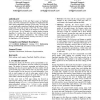Free Online Productivity Tools
i2Speak
i2Symbol
i2OCR
iTex2Img
iWeb2Print
iWeb2Shot
i2Type
iPdf2Split
iPdf2Merge
i2Bopomofo
i2Arabic
i2Style
i2Image
i2PDF
iLatex2Rtf
Sci2ools
117
click to vote
WWW
2006
ACM
2006
ACM
Beyond PageRank: machine learning for static ranking
Since the publication of Brin and Page's paper on PageRank, many in the Web community have depended on PageRank for the static (query-independent) ordering of Web pages. We show that we can significantly outperform PageRank using features that are independent of the link structure of the Web. We gain a further boost in accuracy by using data on the frequency at which users visit Web pages. We use RankNet, a ranking machine learning algorithm, to combine these and other static features based on anchor text and domain characteristics. The resulting model achieves a static ranking pairwise accuracy of 67.3% (vs. 56.7% for PageRank or 50% for random). Categories and Subject Descriptors I.2.6 [Artificial Intelligence]: Learning. H.3.3 [Information Storage and Retrieval]: Information Search and Retrieval. General Terms Algorithms, Measurement, Performance, Experimentation. Keywords Static ranking, search engines, PageRank, RankNet, relevance
Internet Technology | Keywords Static Ranking | Static Features | Static Ranking Pairwise | WWW 2006 |
Related Content
| Added | 22 Nov 2009 |
| Updated | 22 Nov 2009 |
| Type | Conference |
| Year | 2006 |
| Where | WWW |
| Authors | Matthew Richardson, Amit Prakash, Eric Brill |
Comments (0)

